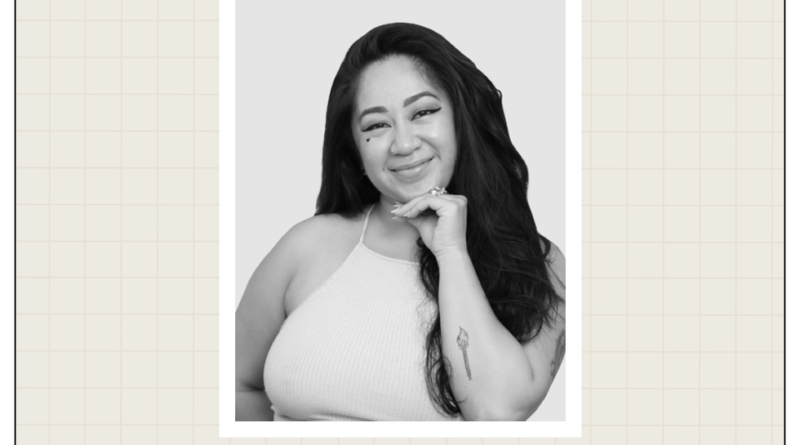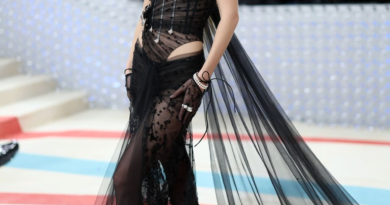How Kim Pham Built Omsom, a ‘Proud and Loud’ Asian Food Brand, and Found Herself Along the Way
In ELLE.com’s monthly series Office Hours, we ask people in powerful positions to take us through their first jobs, worst jobs, and everything in between. This month, we spoke to Kim Pham, the co-founder of Omsom, the “proud and loud” Asian food brand that’s all over your Instagram, and, incidentally, a BDSM educator on TikTok. The daughter of Vietnamese refugees, Pham left the world of venture capital—after being named to the Forbes 30 Under 30 list in 2017—to launch Omsom with her sister, Vanessa, in 2020. Their goal: reclaim and celebrate the often diluted flavors and stories of Asian communities—including their own. Below, Pham unpacks how food became such a central part of her identity and how building the Omsom brand forced her to “examine [her] shit” and embrace her full self.
My first job
When I was 16, I was really plucky and ambitious. No one in my family had gone through the American school system, so I had to forge my own path in every way. At the time, I really wanted to be a journalist, and I was like, “I’m going to send out my resume to all these newspapers.” My “resume” landed in the hands of an early-stage startup in Boston, which was called CitySquares. The CEO emailed me back and was like, “It takes a lot of balls to find the email of this startup and pitch yourself. Come on board.” I joined them in an intern capacity for the summer in 2008, and I absolutely fell in love with startups. I just became obsessed with the fact that I was 16 years old, learning from the CEO, sitting next to him. I had crazy amounts of autonomy and flexibility, and I became obsessed with taking a company from zero to one.
My worst job
I interned one summer at a startup where a chunk of my role was direct sales—hitting the pavement, person-to-person. I was a 19-year-old kid, super shy and kind of unsure of myself. I have deep respect and admiration for people who can do sales; I’m just not one of them. Funnily enough, the CEO of that company is now an investor at Omsom, so I didn’t do that badly, I guess.
How my sister and I created Omsom
We quit our jobs with a mission in mind. For me, that was the reclamation and celebration of Asian flavors and Asian stories that are so often diluted, dumbed down, and compromised in the mainstream. Post-2016 election, both Vanessa and I were feeling deep personal, moral emergencies around the state of the world and wondered, how can we make it better in our small, tiny lane? I wanted to build an unapologetically Asian American brand that I really wish I had growing up. I grew up in a town just south of Boston that was 98 percent white. It was very lower-middle class, super conservative. So I grew up hating myself in every way—as a queer woman, as a Southeast Asian woman, as a woman, as a weirdo and alt kid. Omsom became this solution, in many ways, to a lot of the frustrations and hurt I had been feeling.
Why food is such an integral part of my identity
My parents came to the U.S. post-1975, after the Vietnam War, and came with nothing—no education, no money. So they were oftentimes very, very, very busy. My mother was working two, three jobs at one point. However, every single evening we came together and had a home cooked Vietnamese meal. Growing up as a first-gen American, food became not just a way to survive, but it was also a carrier of culture, of narratives, of my family’s history and legacy. It gave me the perspective that food is so much more than sustenance.
It feels like my whole childhood was defined by food and my relationship to it. For a long time, I was deeply embarrassed that my school lunches looked different and my house smelled like fish sauce. Now I’m like, that was some really painful shit. How can I create a world in which people can bring [this food] into their home if they’re not Asian and love it and, if they are Asian, feel proud?
The joys—and challenges—of building a brand with my sister
At the end of the day, it is the best to build something with her. It’s honestly such a privilege. And I will say, in the beginning, it was very difficult, because we had so much trauma and projections and narratives about each other that we hadn’t truly worked through. We were adults when we started the business, and we were like, we’re good, we’re besties. But it’s not until you start a business that you’re like, all that shit we went through when we were six, seven, eight, 10, 12, 15, all that stuff is still in the room. We know exactly how to trigger each other. We know exactly how to set each other off. So a lot of our journey as co-founders was working through that and healing and embracing vulnerability. Now we’re at a really good place where I feel like I know her better than almost anyone else on this earth. I feel like she can say the same about me. We love and trust each other deeply, and we have very, very healthy boundaries and separation.
How starting Omsom helped me embrace my queerness
I came out pretty late in life, around the time I started Omsom. Starting a business really forces you to examine your shit. It makes you look at yourself, especially when you’re building something as deeply cultural and personal as Omsom. So that’s when I came out as bisexual and started leaning into understanding this kinky side of myself that is now a very big part of my life and my identity.
Part of starting Omsom, for both Vanessa and I, has been a way for us to proudly and loudly live out our truths. I was like, I’m going to become the person that I so wish I had when I was younger. But it’s a conscious decision and risk that we take on. That continues to be hard. How do we draw the line between allowing Kim and Vanessa to be their full selves while also carrying fiduciary responsibility to this business? That’s been a really interesting journey, but I feel so grateful that I can be proud and loud, because I run a business that’s proud and loud. I think I honor both my business and myself by doing those things.
The proudest moment of my career so far
If I had to pick a singular moment, I would say when Whole30 announced that they removed MSG from their restricted [foods] list, and they cited Omsom as one of the reasons why. A lot of that work was driven by me and my desire to tell stories around the xenophobia and bad science that surrounds that ingredient. It showed me that me and my keyboard, putting shit together on Canva, eventually led to this institution—which really affects the way Americans eat—removing an ingredient that has long marred my community. I’m oftentimes very skeptical of changing the machine, and then shit like this happens and I’m like, okay, it does start small.
This interview has been edited and condensed for clarity.
Madison is a senior writer/editor at ELLE.com, covering news, politics, and culture. When she’s not on the internet, you can most likely find her taking a nap or eating banana bread.








